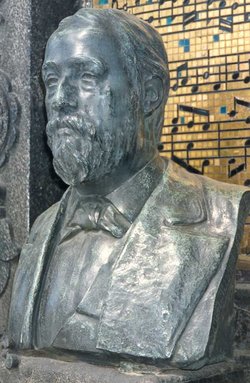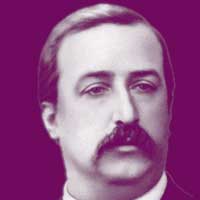Alexander Borodin Biography - A Very Quick Guide

Alexander Porfyrevich Borodin (Алекса́ндр Порфи́рьевич Бороди́н) (November 12, 1833 – February 27, 1887) was a Russian composer who made his living as a chemist. He was a member of The Five, or 'The Mighty Handful', a group of composers dedicated to producing a specifically Russian music.
Borodin was born in Saint Petersburg, the illegitimate son of a Georgian Prince, Luka Gedevanishvili, who had him registered instead as the son of one of his serfs. He received a good education, including piano lessons, but it was chemistry in which he specialised, and he did not receive any formal lessons in composition until 1863, when he was taught by Mily Balakirev.
In 1869, Balakirev conducted Borodin's first symphony, and in the same year, Borodin started on his second symphony. This new symphony was a failure at its premiere, but Franz Liszt arranged a performance of it in Germany in 1880, and this brought Borodin some fame outside Russia.
Also in 1869, Borodin began work on his opera, Prince Igor, seen by some to be his most significant piece. It contains the Polovtsian Dances, which are often performed as a stand-alone work, and in that form probably constitute his best known composition. Borodin left the opera incomplete at his death, composition being slowed by his heavy workload as a chemist. It was completed posthumously by Nikolai Rimsky-Korsakov and Alexander Glazunov.
Despite being recognised as an accomplished composer, Borodin always earned a living as a chemist, and gained great respect in that field also, being particularly noted for his work on aldehydes. As a result, describing himself as a 'Sunday composer', he was not as prolific a composer as many of his contemporaries, but he did write the popular symphonic poem In the Steppes of Central Asia, two string quartets and a handful of songs and piano pieces. He also started work on a third symphony, but that, also, was incomplete at his death (two movements of it were later completed by Glazunov).
Borodin died on February 27, 1887 and was interred in Tikhvin Cemetery at the Alexander Nevsky Monastery, in St. Petersburg, Russia.
In 1954, Borodin was posthumously awarded a Tony Award for composition on the Broadway musical Kismet (musical), by Robert Wright and George Forrest, which reworked several of his compositions.
Sound sample
- Polovtsian Dances from Prince Igor (.ogg format, 19 s, 89 KB) - possibly Borodin's best known piece
Top Pieces on 8notes by Alexander Borodin
